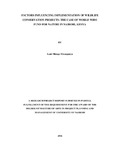| dc.description.abstract | Projects are used in all economic and non-economic fields as mean of organizing the
activity, aiming the achievement of desired objectives. What determines project
success, referred to as success factors, is also approached and considered to be of
great interest. Success approached in relationship with projects is even more
important since the number of failing projects is extremely high, more than one third
of projects failing to reach their objectives. In particular, wildlife conservation
projects have been challenged by rapid and intense environmental changes caused by
increasing human numbers and technological advances. The purpose of this study was
to examine the factors influencing implementation of wildlife conservation projects
by WWF in Nairobi, Kenya. Specifically, the sought to establish the effect of social
cultural factors, political factors, economic factors and legal factors on
implementation of conservation projects by WWF in Nairobi, Kenya. This study used
descriptive survey research design. The target population of this study was the 23
projects being implemented by WWF Kenya. This study was conducted through a
survey targeting project managers and project officers in the projects. The study
collected primary data using a semi-structured questionnaire with both close ended
and open ended questions. A pretest was done to enhance reliability of the research
instrument. Reliability estimate was measured using Cronbach Alpha coefficient (α)
and found to reliable. The data was then analyzed using descriptive statistics. The
descriptive statistical tools used were SPSS and Excel. The study further employed a
multivariate regression model to study the relationship between factors (Sociocultural
factors, Political factors, Legal factors and Economic factors) and
implementation of wildlife conservation projects. The study established that social
cultural factors, political factors, legal factors and economic factors influenced the
implementation of wildlife conservation projects to a great extent. From the
regression analysis and correlation analysis, social cultural factors was found to
influence implementation the of wildlife conservation projects of WWF in Nairobi | en_US |

